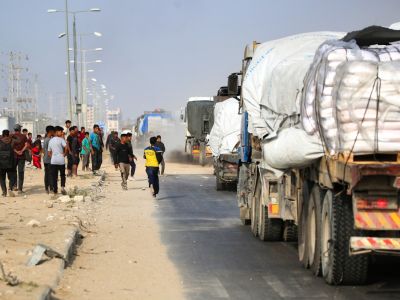Israelis and Palestinians began tentative implementation on Thursday of a truce giving them 48 hours to end five weeks of bloodletting that has killed around 170 people and shattered hopes of peace in the Middle East.
The Israeli army was withdrawing its tanks and lifting a blockade from around Palestinian towns after the overnight announcement of the "understanding" following a meeting between Palestinian leader Yasser Arafat and Israel's former prime minister and Nobel peace laureate Shimon Peres.
And on the Palestinian side, witnesses reported that Palestinian police were out in force in flashpoints across the Gaza Strip to prevent demonstrators from clashing with Israeli troops.
But hardline Palestinian groups opposed to the peace process vowed they would continue their Intifada or uprising until the end of the 33-year Israeli occupation.
The two sides are due to issue simultaneous identical statements formally announcing the truce at 2 p.m. (1200 GMT) Thursday, the anniversary of the 1917 Balfour declaration backing the right of Jews to have a homeland in what was then part of the Ottoman empire.
"Under this agreement on ending the violence, if after two days there are no shootings or burials, a new situation will have been created which will enable us to talk about normalizing relations," Peres told public radio Thursday.
The accord was reached just as the Israeli army prepared to step up its efforts to end by force the Palestinian unrest sparked by a September 28 visit to a disputed holy site in Jerusalem by Israeli opposition leader Ariel Sharon.
Israel had been expected to strike back harshly after the death of three of its soldiers in ferocious gunbattles on Wednesday that also claimed the lives of six Palestinians on one of the deadliest days since the unrest began.
Despite the truce, a Palestinian man died in clashes in a village northeast of Jerusalem, the first to be killed since the announcement. Another died from wounds suffered in clashes in the Karni crossing flashpoint in the Gaza Strip, while clashes also flared nearby that left nine people injured.
The deaths took the toll to 171, the vast majority Palestinians shot dead in clashes across the West Bank and Gaza Strip.
Israeli Prime Minister Ehud Barak's office announced overnight that the two sides had agreed to take steps to renew security cooperation and end "violence and incitement" following the US-brokered truce that was agreed at the Egyptian Red Sea resort last month but never implemented on the ground.
"This understanding has brought about a freezing of the responsive measures that were discussed tonight by the cabinet for the purpose of utilizing the chance to stop the violence," according to a statement read by the spokesman.
Peres, who helped forge the 1993 Oslo peace accords and won the Nobel peace prize along with Arafat and slain Israeli leader Yitzhak Rabin, met Arafat for some two hours.
"There was a reaching of an understanding on measures Israeli should do: withdrawing tanks, lifting the blockade and the closure (of the Palestinian territories), halting its fire and calming the situation," close Arafat aide Abdel Rahim told AFP.
"In addition, there were serious and intense negotiations on the principles of international laws and the basis of the peace process," he added.
But radical Palestinian groups Hamas and Islamic Jihad said the uprising would continue.
"The intifada of our people is to remove the occupation and when there is occupation, Hamas stays with the path of resistance until the end of occupation," said Ismail Abu Shanab, spokesman for Hamas, which has been behind most anti-Israeli attacks.
"Any understanding that does not remove the occupation is not considered enough for Hamas and the Palestinian people," he added.
In a statement issued in Damascus Islamic Jihad said, "The whole people must continue the Intifada throughout the homeland and we must intensify our military operations against the occupation forces and the settlers by using all our resources."
In diplomatic moves, Barak's acting foreign minister Shlomo Ben Ami held talks in Washington with US Secretary of State Madeleine Albright, who is calling on both sides to implement a truce agreed in Egypt earlier this month.
Ben Ami said after the meeting that the violence needed to be dealt with not as a civilian uprising but as a "mini war."
Senior Palestinian negotiator Saeb Erakat is also due to visit the States for meetings with Albright and UN Secretary General Kofi Annan.
During his trip, Erakat planned to ask for international protection for the Palestinians, a halt to the Israeli attacks and closures of Palestinian areas and an international fact-finding committee.
The Palestinians have asked the United Nations to deploy 2,000 observers to protect their civilians in the West Bank and Gaza, according to a document released Wednesday by the Palestinian mission to the world body – JERUSALEM (AFP)
© 2000 Al Bawaba (www.albawaba.com)









